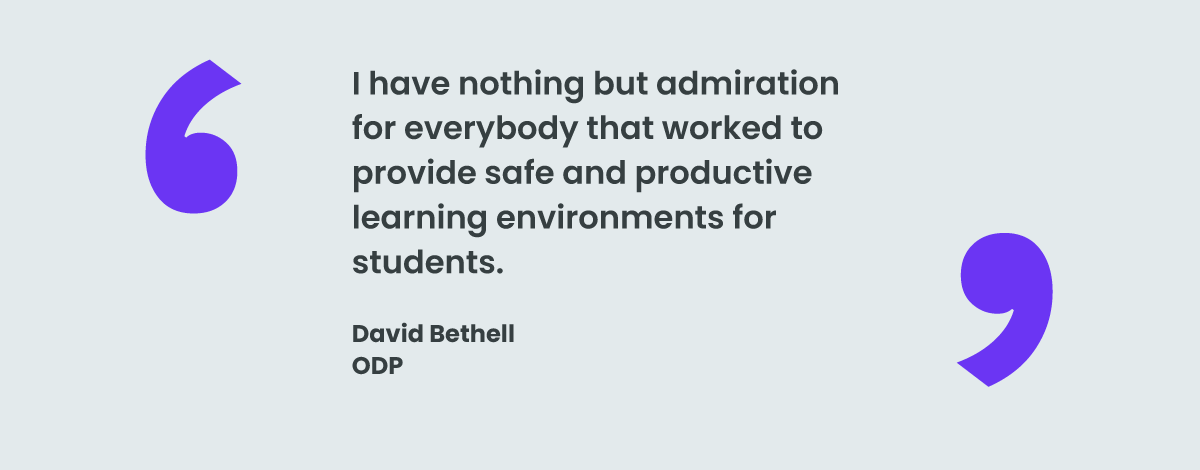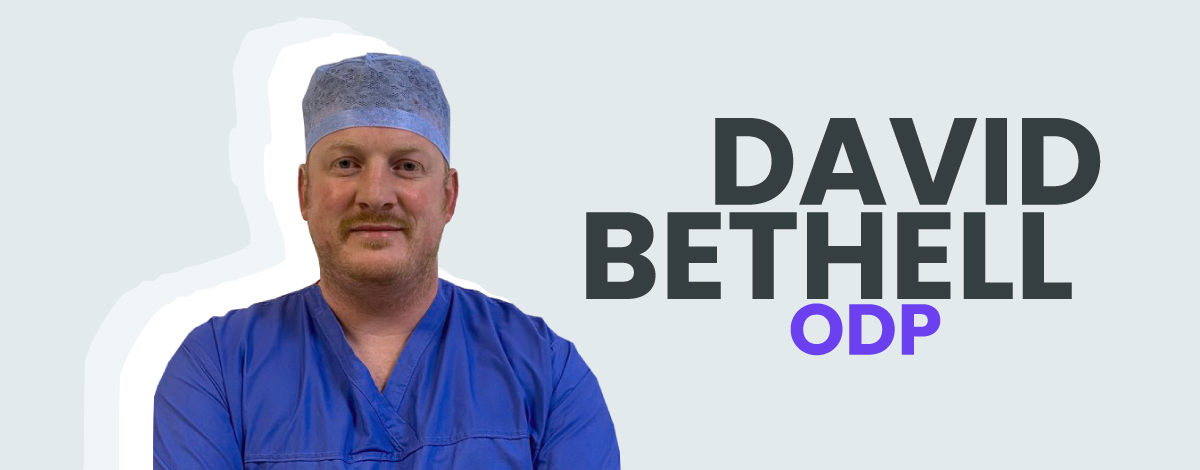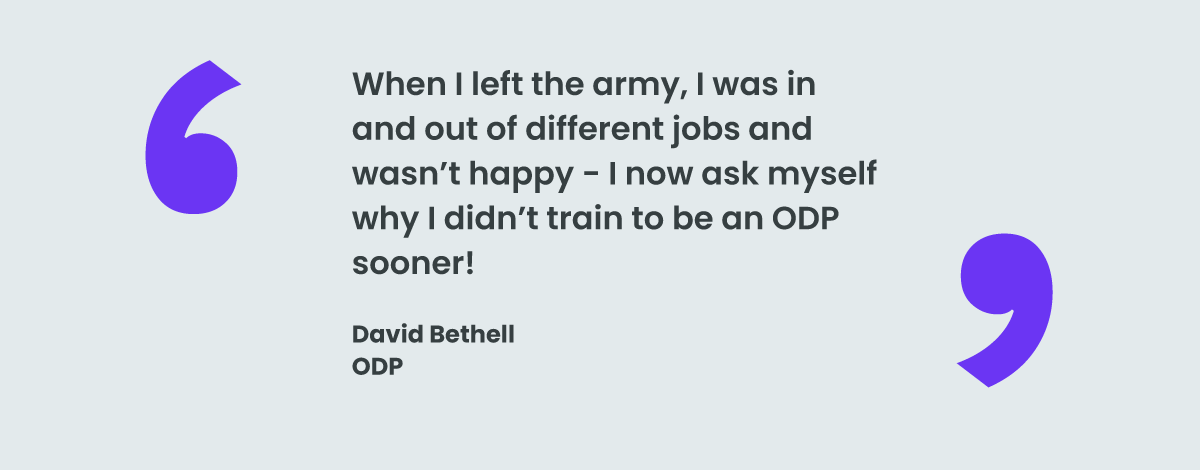Reflections with Julia: ‘I now ask myself why I didn’t train to be an ODP sooner!’
14 May 2021Interview
In this second ODP interview we speak with David Bethell, a newly qualified ODP. After serving for 7 years in the army, David held several jobs before finding his calling working for the NHS. He talks about the challenges of placement access during the pandemic and his admiration for his NHS colleagues who, despite everything, never faltered in their commitment to mentoring and supervising students.
Julia: What changed for you when the pandemic hit?
David: “I was in between my second and third year and was due to go to my general surgery placement, but this was hindered by the pandemic, so I wasn’t able to return. The university therefore rearranged the timetable so that all our theory for the whole year was front-loaded. This therefore bought us time whilst things unfolded.
“I really wanted to help colleagues and patients in any way I could. However, the theory time did allow us to get to grips with three challenging modules, albeit alongside having to help my children full-time with their schoolwork whilst they were now at home.
“I did return on the paid placement scheme in July and August as some surgeries were returning. Things had changed a lot. There were new policies in place, there was the wearing of full PPE, and the set up of the theatres had changed, with some theatres and recovery areas even being used as makeshift Covid wards.
“I found the new procedures that were introduced very interesting. Whilst the fundamentals of the job were the same, lots of little tasks are now being done differently, from how we bag waste, to the way we communicate with patients or change out of scrubs. All these little things had an extra level of precaution attached to them. I found it really interesting to learn the actual reasoning behind these changes.”
What were the biggest challenges?
“I think every student would say that one of the biggest factors affecting them throughout the pandemic was not being able to put your theoretical learning of university modules into immediate practice, like we would normally do.
"COVID made placements an issue because staff were off work shielding, or being redeployed to other areas including ITU, meaning operating lists weren’t being fulfilled. So there was understandably, nowhere for students to learn, and also not enough supervisory staff available. That did vary significantly between regions - some localities weren’t overly affected, but others experienced a complete wipeout of placements.
“There was also an issue around when schools returned, as only the children of key workers could go back. Although there was government guidance on this, it was being interpreted differently in different areas. The universities sent us letters to say we were classed as key workers, but schools would only let you have access to the schooling if you were on placement, some gave access to it at all times, and others wouldn’t let students have access to it at all. It was affecting university students in the same cohorts disproportionately as, for example, my university has students living across several different local authorities.
“Also online learning doesn’t suit everyone, so the students who struggled with it for their theory modules were disadvantaged from that perspective too.”
What got you through these times?
“The main thing that got me through my studies during the pandemic was that the finishing line was in sight and that I would soon start practising and earning a salary. As a self-funding student, it’s certainly not been a lucrative three years!
“I also found a real love for the job. There was a period of time in my second year where I was close to leaving the programme. The rigour and financial pressures were getting to me and putting a strain on my family. I started asking myself why I was doing it to myself, and to them. But after a pep talk with my tutor, I realised that I was really enjoying what I was being trained to do. I needed to persevere with the hardship for the greater good that would come from it. I am so proud of myself for qualifying - I now have a first class degree (having previously only had my GCSEs), and a job that I enjoy with a lot of career prospects.
“The reason I got into the profession was to be able to help people when they really need it. When you see people coming into the anaesthetic room and they’re actually petrified about what's happening, being able to comfort them is really gratifying.
“When I left the army, I was in and out of different jobs and wasn’t happy - I now ask myself why I didn’t train to be an ODP sooner!”

What has inspired you the most in recent months?
“The resilience of students. How they worked through the continuous uncertainty, whilst maintaining the desire to continue with their studies. As well as coming together in ways we wouldn’t have otherwise done. Students from different universities were talking to each other, sharing experiences, as well as students from other professions interacting, too.
“Furthermore, seeing how our lecturers and practice mentors still prioritised us, and that never wavered. I have nothing but admiration for everybody that worked to provide safe and productive learning environments for students.”
How did you access CPD over the last year?
“Over the course of the pandemic, there have been a lot of webinars, especially in regards to COVID. I was mindful that I had to focus on what I was doing for university and so didn’t want to overload myself. However I found watching these webinars gave me a good overview of what I would be going into, with a fundamental understanding of why we were doing things in those ways.
“We were encouraged to keep a portfolio over the three-year course of any CPD activities we undertook, which also benefits us from a regulatory point of view going forward.”
What does the future look like?
“I got a job working in the trust where I completed most of my clinical placements. The reality of qualifying has really hit home, especially as I will soon have to go looking for support rather than it being over my shoulder. I have quickly come to realise there are parts of the role that you don’t see as a student, because they just happen “automatically” or in the background. For example, in my first week, we had two procedures cancelled because the patient wasn’t fit for surgery, and another procedure was stopped halfway through. So I was tasked with leaving the theatre to inform the relevant people; I hadn’t realised before that this was something that I had to do as part of my role.
“It’s the really small things that can eat into your time if you have never done them before, which is difficult when you have a busy operating list. I am also still overthinking things a lot, so I don’t miss anything.
“So for now I am just focused on settling into the ODP role and I’m sure I’ll get there soon.”
A huge thank you to David for taking the time to reflect with us on his experience. If you found this article useful or inspiring, we would be so grateful if you could share it on Twitter.
Julia helps you record, reflect, and report on your CPD through our website and app.
It's an easy way for you to stay on top of your CPD. Sign up for a 14 day free today.

